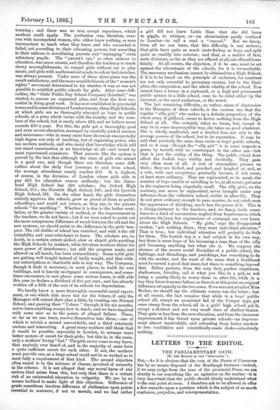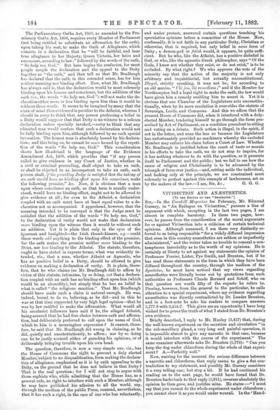LETTERS TO THE EDITOR.
THE PARLIAMENTARY OATH.
[To THE EDITOR OT THE " &ROTATOR."]
Srx,—As it is obvious that the vote of the House of Commons has by no means disposed of the Bmcllangh business—indeed, if we may judge from the tone of the provincial Press, we are shortly to see something like an agitation on the matter—it is very important that the public should clearly understand what is the real point at issue. I therefore ask to be allowed to offer a few remarks upon a question which is the subject of so much confusion, prejudice, and misrepresentation. The Parliamentary Oaths Act, 1866, as amended by the Pro- missory Oaths Act, 1868, requires every Member of Parliament (not being entitled to substitute an affirmation for the oath), upon taking his seat, to make the Oath of Allegiance, which consists in a declaration that he "will be faithful, and bear true allegiance to her Majesty, Queen Victoria, her heirs and successors, according to law ;" followed by the words of the oath, " So help me, God." Bat here begins the confusion, for most people couple the declaration and the appeal to the Deity together as " the oath," and then tell us that Mr. Bradlaugh has declared that the oath, in this extended sense, has for him neither meaning nor binding effect. Now, what Mr. Bradlaugh has always said is, that the declaration would be most solemnly binding upon his honour and conscience, but the addition of the oath (i.e., the words " So help me, God ") will not make the de- claration either more or less binding upon him than it would be without those words. It seems to be imagined by many that the state of mind thus evidenced is peculiar to the Atheist, whereas I should be sorry to think that any person professing a belief in a Deity would suppose that that Deity is no witness to a solemn declaration unless specially invoked,—sorry to think that any educated man would confess that such a declaration would not be fully binding upon him, although followed by no such special invocation. The honest man is absolutely bound by his declara- tion; and this being so, he cannot be more bound by the repeti- tion of the words " So help me, God." This consideration shows how ill-advised is the language of the Evidence Amendment Act, 1869, which provides that "if any person called to give evidence in any Court of Justice, whether in a civil or criminal proceeding, shall object to take an oath, or shall be objected to as incompetent to take an oath, such person shall, if the presiding Judge is satisfied that the taking of an oath would have no binding effect upon his conscience, make the following promise," &c. Now, it is obvious that a man upon whose conscience an oath, as that term is usually under- stood, would have no binding effect, ought not to be allowed to give evidence at all ; for even to the Atheist, a declaration coupled with an oath must have at least equal value to a de- claration not so accompanied. I apprehend, however, that the meaning intended to be conveyed is that the Judge must be .satisfied that the addition of the words " So help me, God," to the declaration of verity would not make that declaration more binding upon the witness than it would be without such an addition. Yet it is plain that only in the eyes of the ignorant and benighted—the Irish thumb-kissers, e.g.—could 'these words add anything to the binding effect of the promise; for the oath makes the promise neither more binding to the Deist, nor less binding to the Atheist. The statute, therefore, ought to have stated in express terms, what was evidently in- tended, viz., that a man, whether Atheist or Agnostic, who has no positive belief in a Deity, should be allowed to give evidence on making a declaration of verity. It is plain, there- fore, that he who claims (as Mr. Bradlaugh did) to affirm by virtue of this statute, intimates, by so doing, not that a declara- tion coupled with an oath has no binding effect upon him (which would be an absurdity), but simply that he has no belief in what is called " the religions sanction." That Mr. Bradlaugh should have made such a claim is natural enough. He was, indeed, bound to do so, believing, as he did—and in this he was at that time supported by very high legal opinion—that he was by law entitled to make the affirmation. What would all his secularist followers have said if he, the alleged Atheist, being assured that he had free choice between oath and affirma- tion, had deliberately preferred to call upon the name of God, which to him is a meaningless expression P It cannot, there- fore, be said that Mr. Bradlaugh did wrong in claiming, as he did, quietly and unostentatiously, to affirm; nor by so doing can he be justly accused either of parading his opinions, or of
deliberately bringing trouble upon his own head. •
The question, therefore, is now a very simple one, viz., has the House of Commons the right to prevent a duly elected Member,-subject to no disqualification, from making the declara- tion of allegiance, emphasised as it is by oath appealing to the Deity, on the ground that he does not believe in that Deity ? That is the real question; for I will not stop to argue with those sophists who, while admitting that the House has, as a general rule, no right to interfere with such a Member, although he may have published his atheism to all the world, say, through the medium of the public Press, contend, nevertheless, that it has such a right, in the case of one who has reluctantly,
and under protest, answered certain questions touching his speculative opinions before a committee of the House. Now, confessedly, it is not faith in any particular Deity, Christian or otherwise, that is required, but only belief in some form of Deity ; a demon-god or fetish would, it appears, be quite suffi- cient. But he who, like the Atheist, has a positive disbelief in God, or who, like the agnostic Greek philosopher, says " Of the Gods, I know not whether they exist, or do not exist," is to be excluded. By what right? We who approve the vote of the minority say that the action of the majority is not only arbitrary and inquisitiorial, but actually unconstitutional. Illegal, strictly speaking, it may not be; for according to an old maxim, " fee, ibi reniedium ;" and if the Member for Northampton had a legal right to make the oath, the law would have given him a remedy enabling him to assert it. Yet it is obvious that one Chamber of the Legislature acts unconstitu- tionally, when by its mere resolution it over-rides the statute of Sovereign, Lords, and Commons. And this we affirm that the present House of Commons did, when it interfered with a duly- elected Member, tendering himself to go through the form pre- scribed by Act of Parliament, as a condition precedent to sitting and voting on a debate. Such action is illegal, in the spirit, if not in the letter, and none the less so because the Legislature has unfortunately provided no machinery whereby the excluded Member may enforce his claim before a Court of Law. Whether Mr. Bradlaugh is justified before the court of taste or morals in his efforts to take the oath, we do not stop to inquire, for it has nothing whatever to do with the question, as it presents itself to Parliament and the public; but we fail to see how the cause of religion and Christianity is to be advanced by the triumph of force over justice,—and, setting aside the individual, and looking only at the principle, we are constrained most solemnly to protest against this example of lawlessness, set us by the makers of the law.—I am, Sir, &c , G. G. G.















































 Previous page
Previous page